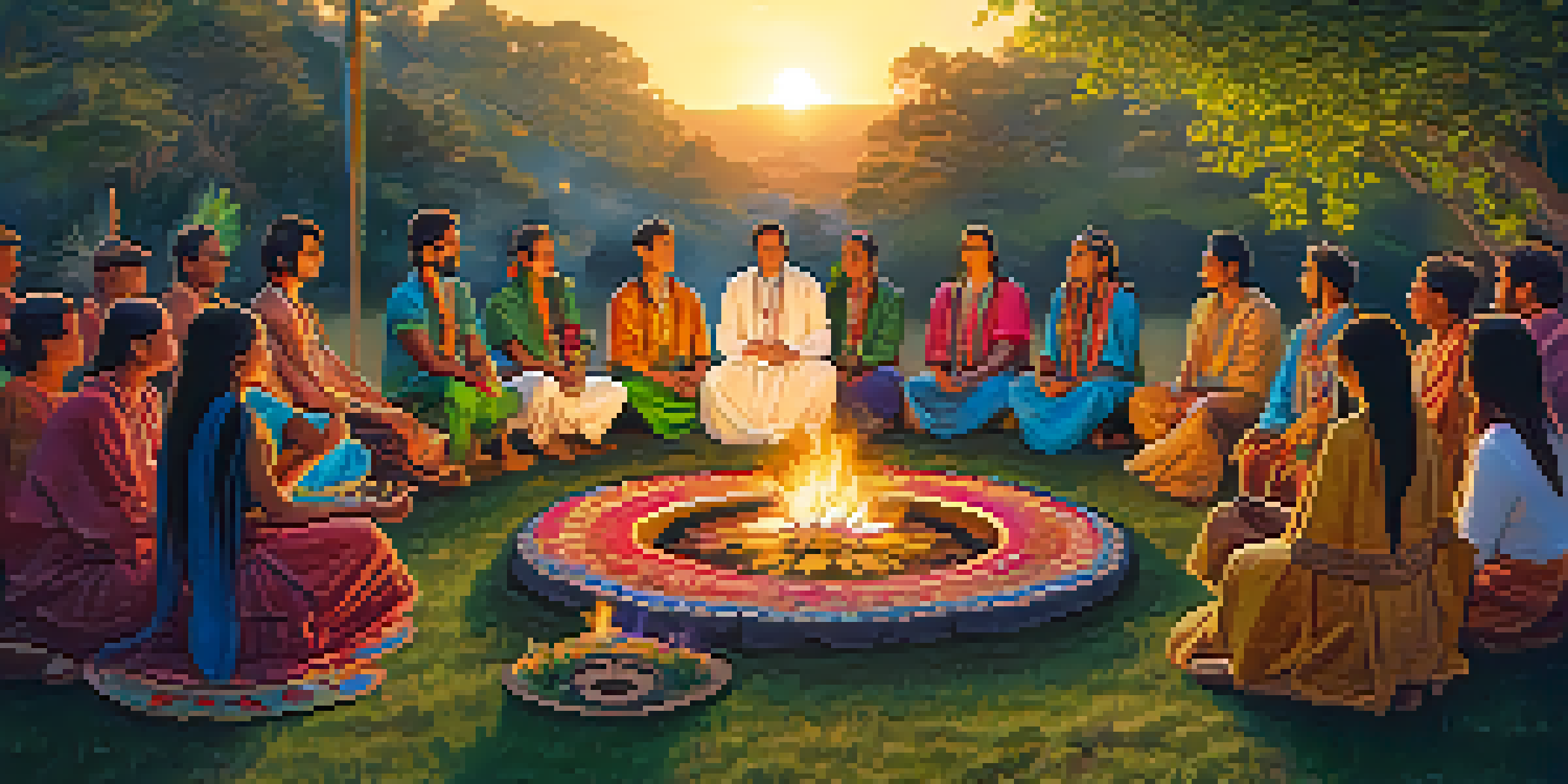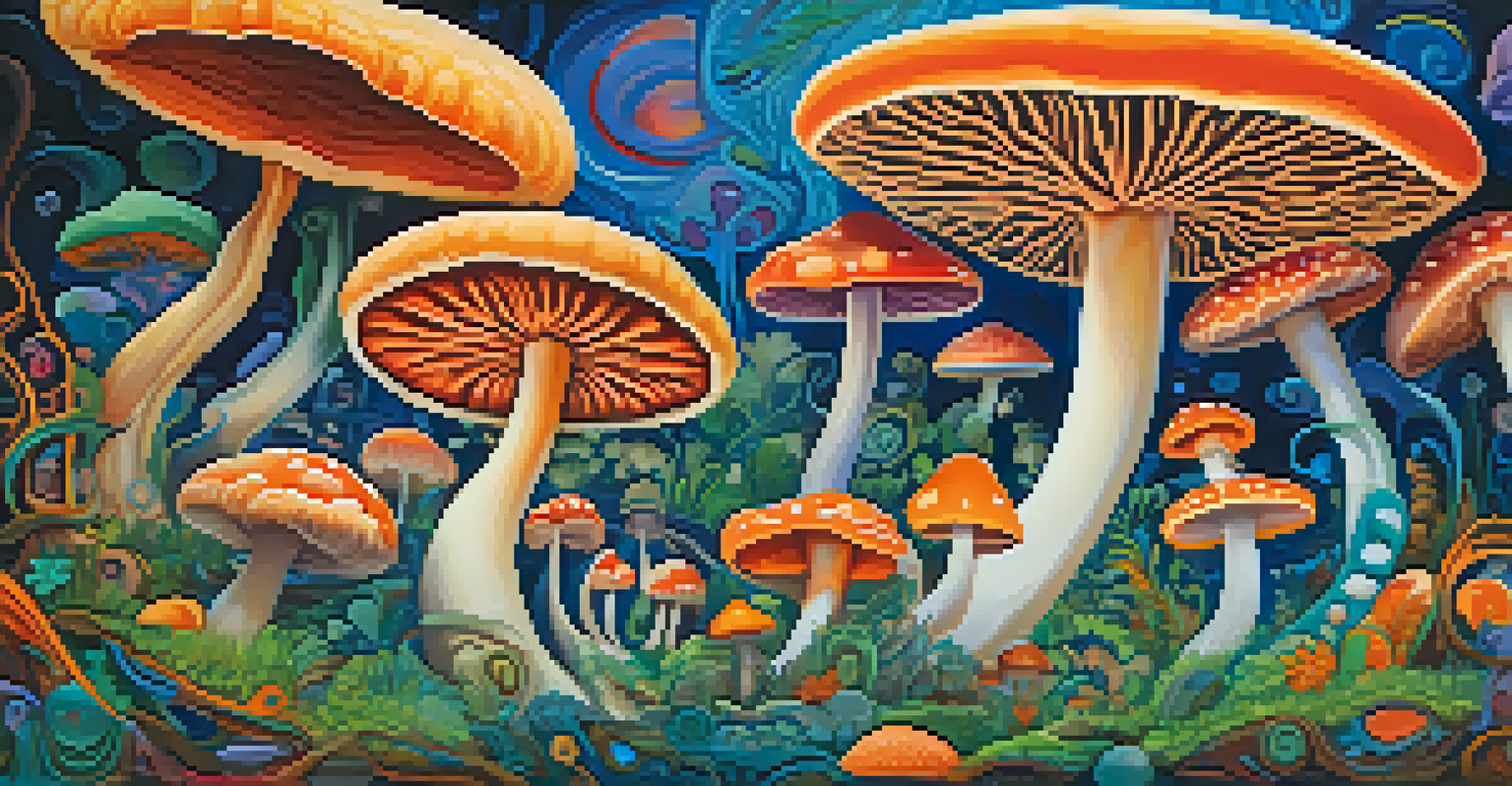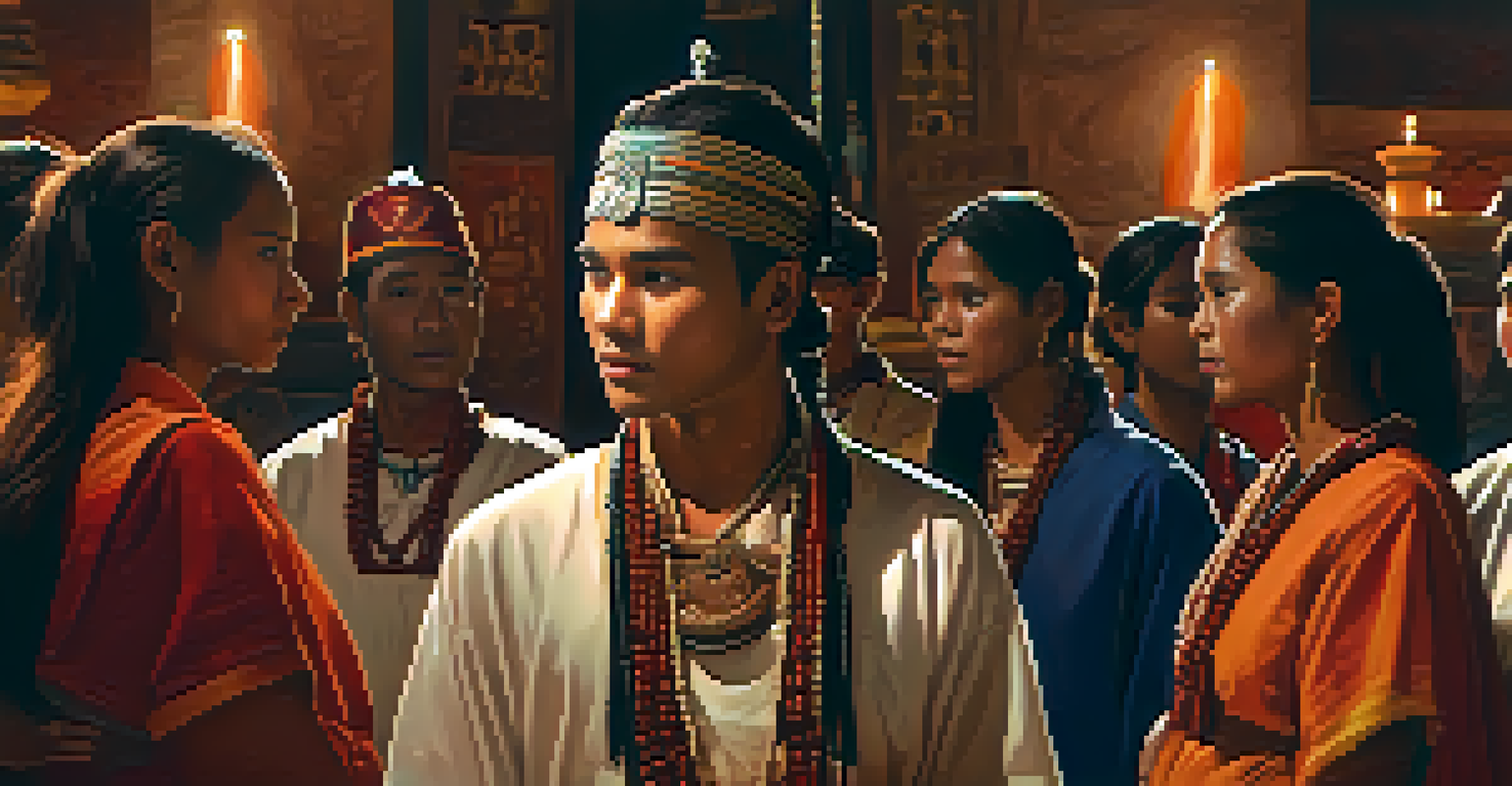Psychedelic Ceremonies: Balancing Tradition and Tourism

Understanding Psychedelic Ceremonies and Their Roots
Psychedelic ceremonies have deep roots in various indigenous cultures, often serving as rites of passage or spiritual healing practices. These rituals typically involve the use of natural substances like ayahuasca or psilocybin mushrooms, which are believed to facilitate profound personal insights and connections to the universe. The ceremonial setting, often rich in symbolism and tradition, helps participants engage with the experience on a deeper level.
The first step in creating a better world is to understand the world we live in.
For many communities, these ceremonies are not just personal journeys; they are communal events that strengthen bonds among participants and honor ancestors. The integration of music, dance, and storytelling enhances the experience, making it a holistic approach to spirituality and healing. Understanding the cultural significance of these practices is crucial, as it lays the groundwork for discussing their modern-day adaptations.
However, as interest in psychedelics grows, there's a risk of commodification, where the essence of these ceremonies may be overshadowed by tourism. Balancing respect for tradition with the influx of tourists seeking spiritual experiences is a delicate dance that many communities are now navigating.
The Rise of Psychedelic Tourism: A Double-Edged Sword
Psychedelic tourism has surged in popularity over recent years, with travelers seeking transformative experiences through these ancient ceremonies. Destinations like Peru and Mexico have become hotspots, attracting individuals from all walks of life hoping to explore their consciousness. This influx of interest can provide economic benefits to local communities, creating jobs and funding projects.

However, this rise in tourism also presents significant challenges, including the potential for cultural appropriation and the dilution of sacred practices. As more outsiders participate in these ceremonies, the unique cultural contexts can become lost, leading to experiences that lack authenticity. It's essential to approach these ceremonies with humility and respect, recognizing their profound significance to indigenous communities.
Cultural Significance of Ceremonies
Psychedelic ceremonies are deeply rooted in indigenous cultures, serving as important rites of passage and spiritual healing practices.
Moreover, the commercialization of these experiences can undermine their spiritual purpose. Instead of being seen as sacred rituals, they may become mere attractions, reducing them to a checklist item for adventurous travelers. This tension highlights the need for a mindful approach to psychedelic tourism that honors both tradition and the transformative nature of these experiences.
Cultural Appropriation vs. Cultural Exchange
As psychedelic ceremonies gain global traction, the line between cultural appropriation and cultural exchange becomes increasingly blurred. Cultural appropriation refers to the adoption of elements from one culture by members of another culture, often without understanding or respect for its significance. In contrast, cultural exchange involves mutual sharing and respect, allowing for a deeper understanding of different traditions.
When we respect the traditions of indigenous cultures, we open the door to profound personal transformation.
For instance, when tourists participate in a traditional ceremony without grasping its historical and cultural context, it can lead to exploitation. On the other hand, when travelers engage respectfully with local communities, seeking genuine guidance and understanding, it can foster meaningful connections and cross-cultural learning. This distinction is vital in preserving the integrity of these ancient practices.
Communities and facilitators are now tasked with educating participants about the cultural significance of these rituals. By encouraging respectful engagement, they can help ensure that the spiritual essence of the ceremonies remains intact, while also offering tourists a transformative experience. This balance is key to fostering an environment where both travelers and indigenous cultures can thrive.
The Role of Ethical Facilitators in Ceremonies
Ethical facilitators play a crucial role in bridging the gap between tradition and tourism during psychedelic ceremonies. These individuals, often rooted in the culture of the ceremony, ensure that the experience is conducted respectfully and safely. They are responsible for creating an environment that honors the traditional practices while accommodating the needs of diverse participants.
In addition to providing guidance and support, ethical facilitators educate attendees on the significance of the ceremony and the substances involved. This education not only enriches the experience for participants but also fosters a sense of respect and responsibility towards the cultural practices. Their role often involves navigating complex dynamics, ensuring that both the community and the tourists benefit from the experience.
Challenges of Psychedelic Tourism
The rise of psychedelic tourism poses risks of cultural appropriation and commercialization, threatening the authenticity and spiritual essence of these rituals.
Moreover, ethical facilitators advocate for the rights of indigenous communities, ensuring that they receive fair compensation and recognition for their traditions. By prioritizing ethical practices, these facilitators help maintain the integrity of psychedelic ceremonies, allowing them to flourish in a way that respects their cultural roots while embracing the curiosity of modern seekers.
The Impact of Legalization on Psychedelic Ceremonies
The legalization of psychedelics in various regions has sparked discussions about the future of psychedelic ceremonies. In some areas, such as Oregon and Canada, the decriminalization of certain substances has opened doors for more structured and regulated ceremonial practices. This shift can bring about increased safety and accessibility for those interested in participating.
However, the legal landscape also raises questions about the commodification of these experiences. As ceremonies become more commercialized, there is a risk that their spiritual essence could be lost in the pursuit of profit. Striking a balance between regulation and preservation is essential to ensure that the core values of these practices are maintained.
Moreover, the legal framework can provide opportunities for education and research into the therapeutic benefits of psychedelics. As more studies emerge highlighting their potential for mental health treatment, the conversation around these ceremonies may evolve, encouraging a deeper understanding of their benefits beyond mere tourism. This evolving landscape presents both challenges and opportunities for the future of psychedelic ceremonies.
Personal Stories: Transformative Experiences in Ceremonies
Many individuals who participate in psychedelic ceremonies report life-changing experiences that often lead to profound personal insights. These transformative journeys can provide clarity on past traumas, relationships, or life choices, allowing participants to emerge with a renewed sense of purpose. Stories of healing often highlight the importance of the ceremonial setting and the guidance offered by facilitators.
For example, a participant in an ayahuasca ceremony might recount how the experience helped them confront their fears and embrace forgiveness. Such narratives illustrate the potential of these ceremonies to facilitate deep emotional healing and connection to oneself. These personal stories not only inspire others to explore similar paths but also underscore the importance of approaching these experiences with respect and intention.
Role of Ethical Facilitators
Ethical facilitators are vital in ensuring that psychedelic ceremonies are conducted respectfully, educating participants while preserving cultural integrity.
However, it’s essential to remember that while many find healing through these ceremonies, experiences can vary widely. Not everyone may find the transformative journey they seek, and negative experiences can occur. Understanding the range of possible outcomes helps demystify the process, allowing potential participants to approach it with realistic expectations.
Finding Balance: The Future of Psychedelic Ceremonies
As interest in psychedelic ceremonies continues to grow, finding a balance between tradition and tourism is more important than ever. Communities must navigate the challenges and opportunities presented by this influx of interest while striving to preserve their cultural heritage. This balance involves collaboration, education, and open dialogue between practitioners and tourists.
One potential solution lies in creating frameworks that prioritize ethical tourism practices, ensuring that local communities benefit from the economic opportunities that arise. By fostering partnerships between tour operators and indigenous leaders, it’s possible to create experiences that honor traditions while providing meaningful engagements for travelers. This collaborative approach can enhance the authenticity of experiences offered.

Ultimately, the future of psychedelic ceremonies lies in mutual respect and understanding. By embracing both the cultural significance and the curiosity surrounding these practices, we can create a path that honors ancient traditions while providing opportunities for personal growth and healing. As we move forward, it’s crucial to keep these principles at the forefront of our discussions and actions.